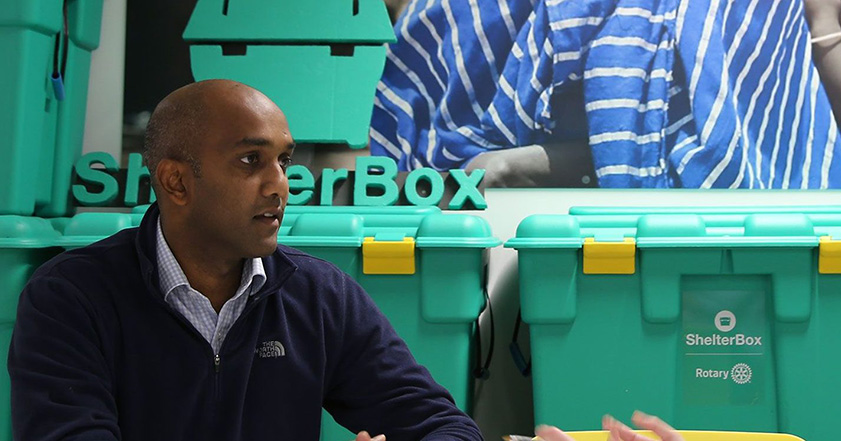Sanj Srikanthan joined ShelterBox in December 2019 as our new Chief Executive.
Sanj arrived at ShelterBox with a wealth of humanitarian experience. Before joining the team here he worked at the International Rescue Committee for 10 years where he progressed to Senior Vice President for Europe and Executive Director for the UK. During his career, Sanj has had significant first-hand experience of humanitarian work. In an earlier role at IRC, he worked as an Emergency Field Director, leading response teams supporting communities in many countries including Mali, Syria, Lebanon and Turkey. And prior to that, he worked for the United Nations Office for the Coordination of Humanitarian Affairs. As if that wasn’t enough, Sanj started out spending 6 years as a Captain in the British Army.Our Individual Giving & Legacies Manager, Kirsty Alexander, caught up with Sanj to ask some of the big questions we’d all like to ask a new CEO…
1. Why ShelterBox? We need to take a step back and look at the world in which ShelterBox operates, which is what is motivating me to work for ShelterBox. We’re at a transition point – the humanitarian crises, disasters of the 20th century have not gone away, they haven’t been addressed and if you overlay that with the frequency at which disasters and conflicts are now happening and go on unresolved, there’s never been a more urgent time for high quality, impactful humanitarian action. And that’s what ShelterBox does. But it does it in a really focused way and that’s a really exciting thing to be a part of. 2. How do you see ShelterBox growing? We should be honest with ourselves and say that sadly, we are a growing organisation. Because we exist to solve problems that society and governments should be able to solve themselves but are unable to. We shouldn’t see growth as a good thing but as a necessary thing in the absence of others leading. The changing climate is going to make places less liveable and shelter is the is first most basic human need alongside food and water, so I can see us pushing the boundaries but also working more closely with others, including local partners, other NGOs and local governments. 3. What do you think the biggest challenges ShelterBox faces are? The biggest challenge is the safety of our staff on deployment. Increasingly, humanitarians are not respected. There are so many non-state, armed groups who put our programmes and lives at risk (and the people we help) so that’s one of the biggest risks. 4. At a recent staff meet and greet in Truro, you talked about how important our supporters are, can you expand on this a bit? Never take your supporters for granted. Treat them with respect and give them credit by helping them understand why we are helping where we are, what’s happening on the ground and why we continue to need their support in a way that’s meaningful and more than just glossy posters! It sounds trite but they are part of the ShelterBox family so to treat them any differently is to take them for granted which I would never do. 5. We have something called ‘Shine for ShelterBox’, where supporters fundraise by hosting a candlelit dinner party for their friends. If you could have any three people (dead or alive) over for dinner – who would they be? Robert Kennedy – If ever there was a window into the unfulfilled leader it’s him. I’d love to hear more about what he would have done. Dennis Mukwage – He’s a Nobel-prize-winner but for decades he was unknown. He runs a clinic in Eastern Democratic Republic of Congo (DRC), helping women and girls who are survivors of sexual assault (amongst other things), and he and his clinic are a great beacon of hope and rescue for millions of women over several decades. At the moment it’s a very serious dinner party, so my third guest would be Sindhu Vee – she’s hilarious and an ex-investment banker who has stumbled into comedy. The common theme with these three people is never accepting the status quo and never accepting the world the way it is – it would be fascinating to have those three together. 6. Finally, what’s the best piece of advice you’ve ever been given? Always assume positive intent. Whether it’s working around the world, or in HQ in the UK, it’s easy to jump to the wrong conclusions about people. If you take a step back and reflect you’ll find that in many instances there’s positive intent behind most people’s actions. Meet more members of the ShelterBox team here.
